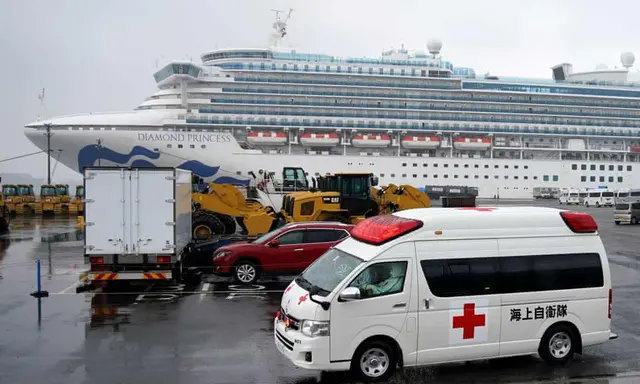By APD writer Alice
The wide and prolonged spread of the acute respiratory disease caused by a new strain of coronavirus (COVID-19) has had negative impacts on the Japanese economy, especially in tourism, retail and export.
The Japanese economy is facing a risk of slowdown due to the spread of COVID-19. Tourism and retail activities are affected as the number of tourists from China and other countries as well as their spending sharply fall.
The COVID-19 outbreak has also affected Japan's trade and investment activities, as the slowing growth of China's economy has negative impacts on Japanese companies’ production as well as disrupts supply chains.
The outbreak has made Japanese policymakers increasingly concerned that the world's third largest economy, ever affected by weakening private consumption and global demand, may fall into recession.
Japanese automakers have parts production facilities in China, while Japanese retailers also sell large quantities of goods in the country. China is Japan's second largest export market. Therefore, the COVID-19 outbreak has also dealt a blow to a number of Japanese department stores and hotels, as Chinese tourists accounted for 30% of the total international tourist arrivals to Japan and 40% of total foreign tourist spending in the country in 2019.
The International Civil Aviation Organization (ICAO) estimated that Japan's tourism industry could lose $1.29 billion in the period from Japanuary to March 2020, due to a decline in the number of Chinese tourists.
According to the Resona Research Institute's forecast, the spending of foreign visitors in Japan could be reduced by at least 624.4 billion JPY ($5.68 billion), causing serious damage to the Japanese tourism industry. Hotels and retailers such as supermarkets and cosmetics stores will be among the worst hit.
The institute stated that if the COVID-19 epidemic continues to spread until April, the damage to Japan’s economy would be equivalent to the level of damage caused by the Severe Acute Respiratory Syndrome (SARS) during 2002-2003. The number of foreign tourists coming to this country will continue to decrease until May, resulting in respective reductions of 171.9 billion JPY and 238.9 billion JPY in the total spending of foreign tourists for accommodation services and goods.
Japan's local economies have been hit by the declining number of international tourists, mainly due to China's group travel ban to curb the spread of the novel coronavirus.
The COVID-19 epidemic and its associated consequences could negatively affect localities in Japan if it prolongs. Tokyo and six other prefectures in the Kanto region, eastern Japan, will suffer damage of 218.1 billion JPY, while Osaka and five other prefecture in the Kansai region, western Japan, lost 190.5 billion JPY.
According to a representative of the Hokkaido Bus Association, not only Chinese tourists but also those from Southeast Asia have canceled previously booked tours or services.
A survey of member bus operators of the association showed that the number of bus trips canceled by tourists in the first quarter of 2020 has reached 1,700, equivalent to a loss of 110 million JPY ( approximately $1 million).
Meanwhile, the number of visitors to the annual snow festival in Sapporo city in northern Japan, a famous Japanese cultural event that attracts Chinese tourists, decreased by 710,000 people compared to the 2019 festive season.
According to the government of Hokkaido prefecture, at least 147,000 guests have canceled their reservation as of March in Sapporo and other cities in Hokkaido. Hokkaido estimates its tourism revenue will be reduced by 20 billion JPY if by March, Chinese tourists are still "absent".
The tourism activities of Osaka in western Japan are also facing difficulties due to the negative impact of the COVID-19 epidemic. The outdoor observatory at the Umeda Sky Building in Osaka used to attract about 1.2 million visitors per year, mostly foreign tourists. However, the number of visitors to this famous attraction has decreased significantly since January.
Royal Hotel Ltd., the operator of the Osaka-based Rihga Royal hotel chain, last week lowered its revenue estimate for 2019-2020 fiscal year (ending March 2020) and expected its profits in this period to plunge 70% as compared to the previous fiscal.
According to Tsutomu Yuguchi, research director at Hamagin Research Institute in Yokohama, if the COVID-19 epidemic lasts for 6-12 months, tourism-related businesses will face the risk of "domino" bankruptcy and the most worrying thing is that if more people refuse to go out or travel for fear of being infected with the novel coronavirus, the damage will be even greater.
Earlier, the Daiwa Research Institute had predicted that in the most optimistic scenario in which COVID-19 is eliminated within the next three months, this epidemic will still "take" 1 trillion JPY (over $9 billion) of Japan's GDP in 2020. The number of Chinese visitors to the country could drop by 1 million. In case that the epidemic lasts one year, the institute said Japan's exports would plummet due to the economic downturn in China. In such a scenario, Covid-19 will cause Japan's GDP to decrease by nearly 1%.
In efforts to deal with the epidemic, on February 14, the Japanese cabinet approved a plan to spend 10.3 billion JPY($94 million) sourced from the contingency fund on the prevention and control of COVID-19.
The move came just a day after Japan's Ministry of Health, Labor, and Welfare confirmed the first death caused by COVID-19 in the country.
By 8pm on February 19, the number of COVID-19 infection cases in Japan hit 84, including one death. There is a high risk for Japan to see the figure increase as 621 people on board luxury cruise ship Diamond Princess anchoring off the coast of Japan’s Yokohama were tested positive for the new strain of coronavirus.
(ASIA PACIFIC DAILY)
 简体中文
简体中文

